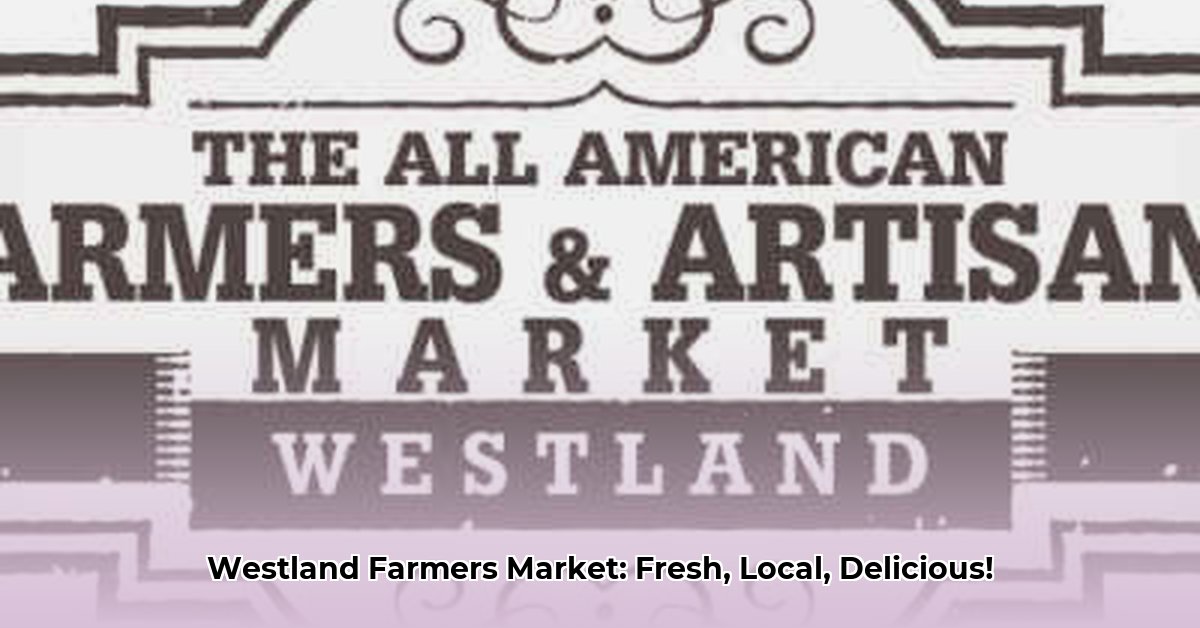
Farmers Market Westland MI: Your Fresh Food Connection
The Westland Farmers Market is a vibrant community hub, celebrating local agriculture and strengthening the Westland, Michigan community. It directly connects local farmers with consumers, creating a mutually beneficial relationship that boosts the local economy and promotes sustainable farming practices. More than just a place to buy groceries, it's a window into Westland's thriving food scene.
Who Benefits from the Westland Farmers Market?
The market offers widespread benefits. Farmers increase profits by selling directly to consumers, eliminating intermediaries. Westland residents access high-quality, locally grown food, supporting their neighbors and the local economy. Children participating in the Power of Produce Club learn about healthy eating habits. Even local musicians and artisans contribute to the market's vibrant atmosphere.
What Makes the Westland Farmers Market Special?
The market's success stems from collaboration and teamwork among farmers and the city of Westland. Initiatives like the Power of Produce Club demonstrate the city's commitment. However, challenges remain. The seasonal nature of the market limits its reach, and reliance on sponsorships creates funding uncertainty.
Challenges and Opportunities for Growth at the Westland Farmers Market
The Westland Farmers Market continually evolves. Addressing its challenges while capitalizing on opportunities is crucial for its future growth.
Challenges:
- Seasonality: The market's seasonal operation restricts year-round access to local produce.
- Geographic Reach: The market's influence is primarily limited to Westland.
- Funding: Dependence on sponsorships creates financial instability.
- Data Deficiency: Lack of comprehensive data hinders informed decision-making.
Opportunities:
- Year-Round Operation: Extending operations, perhaps through an indoor location or online sales, could significantly increase reach.
- Product Diversification: Offering a wider variety of goods (value-added products, crafts) could attract more customers.
- Community Engagement: Targeted marketing and community events could increase visibility and participation.
- Improved Data Collection: Systematic data collection on sales, vendors, and customer preferences would enable strategic planning.
A Roadmap for Success: Actionable Steps for a Thriving Market
The following steps can improve the Westland Farmers Market. Ongoing evaluation and assessment are vital for long-term success.
| Stakeholder | Short-Term Goals (0-1 year) | Long-Term Goals (3-5 years) |
|---|---|---|
| Local Farmers | Improve vendor onboarding; explore online sales; diversify product offerings. | Secure land access; develop efficient post-harvest systems; adopt sustainable practices. |
| Westland Residents | Increase market attendance; actively support market through advocacy. | Promote the market's community well-being; support expansion efforts. |
| City of Westland (DDA) | Secure additional sponsorships; analyze market data; seek grant opportunities. | Develop a local food system plan incorporating the farmers market. |
| Artisans & Musicians | Increase artisan participation; organize workshops and skill-sharing events. | Develop market brand identity; promote cultural and economic benefits to a wider audience. |
How to Measure KPIs for Sustainable Agriculture Market Success
Effective regenerative agriculture balances profitability, environmental responsibility, and community engagement. Key Performance Indicators (KPIs) are essential for tracking progress and making data-driven decisions. These KPIs should encompass financial, environmental, and social factors. Regular monitoring is key for adaptation and long-term sustainability. Different stakeholders have unique perspectives on KPI priorities.
Key Takeaways:
- Successful regenerative agriculture requires balancing profitability with environmental responsibility and community engagement.
- Measuring KPIs is crucial for tracking progress and informed decision-making.
- KPIs should encompass financial metrics, environmental impact, and social factors.
- Regular monitoring and analysis of KPIs are necessary for adapting to changing conditions and achieving long-term sustainability.
Financial Health:
- Gross Revenue: Total sales by all vendors.
- Net Profit: Revenue minus expenses.
- Vendor Profitability: Individual vendor success.
- Return on Investment (ROI): Market investment payoff.
Environmental Impact:
- Waste Reduction: Waste generated and recycling/composting rates.
- Water Usage: Irrigation practices and water consumption.
- Energy Consumption: Vendor energy usage and potential for renewable energy.
- Carbon Footprint: Reducing transport distances and waste.
Community Engagement:
- Customer Satisfaction: Surveys and feedback.
- Vendor Satisfaction: Vendor support and needs.
- Community Events: Events promoting engagement.
- Local Sourcing: Proportion of locally sourced produce.
Temporal Trends:
- Revenue Growth: Year-over-year revenue growth analysis.
- Customer Base: New customer acquisition and retention rates.
- Vendor Turnover: Vendor retention strategies.
- Environmental Improvements: Progress toward sustainability goals.
By consistently tracking these KPIs, the Westland Farmers Market can gain a clear understanding of its overall health and effectively contribute to a sustainable local food system. It’s a vital community asset, and its continued success requires ongoing monitoring and adaptation.